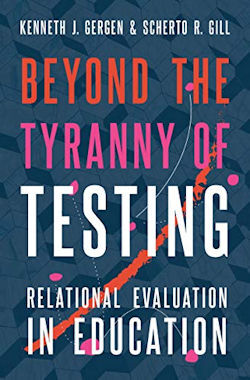Education
The Future of Grades
New research challenges the status quo of measurement-based assessment.
Posted November 23, 2020

In today’s environment of rapid and unpredictable change, the status of public education has never been more uncertain. The pandemic has added fuel to an already accelerating firestorm of public and academic scrutiny about an antiquated system that is failing millions of children. Change seems inevitable. But what kind of changes are needed?
Beyond the Tyranny of Testing: Relational Evaluation in Education is a new book by Drs. Kenneth Gergen and Scherto Gill that argues for needed change in how schools measure student success. Supported by copious research, the authors demonstrate how current measurement-based assessment and high-stakes testing not only undermine learning but also sacrifice the well-being of students and teachers.
This book could not be timelier.

COVID-19 has impacted education throughout the world, creating opportunities to reimagine schools as inclusive and relational learning communities. Ken Gergen, an internationally known social psychologist and President of the Taos Institute, is recognized for his contributions to social constructionist theory. From the Taos Institute website, “Constructionist theory and practice locates the source of meaning, value, and action in the relational connection among people. It is through relational processes that we create the world in which we most want to live and work.”
How does the constructionist theory pertain to education, grades, and testing?
Whether or not people have ever heard of the social constructionist theory, they are likely familiar with some of its core tenets.
Social constructionism views education as a social system that influences students through the school’s culture. This culture is a shared collection of relational experiences that can either bring meaning to individuals or cause conflict for them.
This lens of thinking is contrary to the long-standing factory view of education that sees learning as a predictable outcome or product. When viewed through this mechanistic lens, the interconnected processes of schooling can be reduced to their smallest parts, like test scores, teacher performance, and class size. Then each part can be measured quantitatively to access performance.
In recent years, research has challenged the usefulness of this mechanistic framework, arguing that changes in society require changes in thinking about education. Teachers, parents, and communities are beginning to understand that the lens through which education is viewed is paramount to its success. More than 68 million viewers, for example, have watched Sir Ken Robinson’s TED Talk, where he made a case for reimagining education so that it nurtures rather than undermines creativity.
Gergen, Gill, and Robinson view education through a similar systemic lens. They understand intelligence to be dynamic and think that positive human development comes about through school cultures that value relational interaction and encourage different ways of seeing things. These kinds of cultures are not built around standardization but rather around people. They encourage developmental equity—the right that all children have to the relationships and experiences that help them thrive in school and life.
Evaluation vs. Assessment
According to Gergen and Gill, “Test performance is becoming the very purpose of education. The tail now wags the dog.” They acknowledge many innovations in education that support a more relational orientation, like project-based learning, collaborative classrooms, and other emergent curricula. However, they point out that traditional testing methods persistently obstruct these efforts.
Evaluation is a vital aspect of the learning process. But do the current methods of testing achieve their goals? A strong body of research says “no.”
Beyond the Tyranny of Testing offers a ground-breaking approach to eliminating traditional methods of assessment and replacing them with what the authors call "relational evaluation." This approach replaces the outdated notion that education should be a standardized product with the idea that learning is relational, embodied, co-creative, generative, and multidimensional.
If one embraces the importance of the relational nature of learning, it is easy to see that the present focus on examinations, grading, and high-stakes testing undermines learning. The authors claim, “Through their mere participation in the school system, children and youth thus come to learn that they are able or disabled in ways they never imagined. This hierarchy of worth ripples through relationships among students … The bulk of the students will learn that there is nothing special about them, nothing to celebrate.”
Meaningful education, according to Gergen and Gill, depends on having all relationships flourish, including those in the classroom, throughout the school community, and in a student’s family life. To achieve this goal, the authors outline chapter by chapter ways to bring relational evaluation into classrooms and how these evaluations differ from traditional assessments.
Features of Relational Evaluation
If the process of relating is what makes learning come alive, then relational evaluations will boost learning, creativity, and many other internal strengths that teachers and parents hope to instill in children. The authors lay out two major features of relational evaluation:
1. A Process of Co-inquiry
Evaluation is a collaborative, ongoing, and formative process between students, parents, and teachers that includes questioning and listening. It is not focused on finding a single answer or point of “knowing.” It does not include assigning grades or making judgments about students’ work. Rather the co-inquiry process is about developing relationships where everyone feels invested.
2. Focused on Valuing
Unlike traditional assessment processes that jeopardize students’ self-worth, relational evaluations aim to affirm the value of the learner. They should uncover a student’s hopes and aspirations and support that child in the process of finding meaning and purpose. Evaluation should be understood as a growth process that informs each student’s path to flourishing.
The authors suggest that relational evaluation should apply to the whole of education—students, teachers, administrators, and schools. Ideally, all stakeholders, including parents, community members, and policymakers, can and should be involved.
Systemic Transformation Through Relational Evaluation
Not only does Beyond the Tyranny of Testing make a convincing case for replacing traditional measurement-based assessment with relational evaluation, but it also digs deeply into how this is accomplished at every level of the school, including primary education, secondary education, teacher evaluation, and school evaluation.
The authors provide detailed examples and real stories of students who have benefited from relational evaluations and how these formative conversations have contributed to their success and well-being.
With the idea that schools should be learning communities rather than assessment mills, Gergen and Gill make the argument that teachers, students, and administrators should focus on improving learning and well-being. They suggest that these stakeholders “are not in competition, not under surveillance, not fearing grades and ranking, but working together toward valued futures.”
References
Gergen, K. J., & Gill, S. R. (2020). Beyond the Tyranny of Testing: Relational Evaluation in Education. New York: Oxford University Press.




